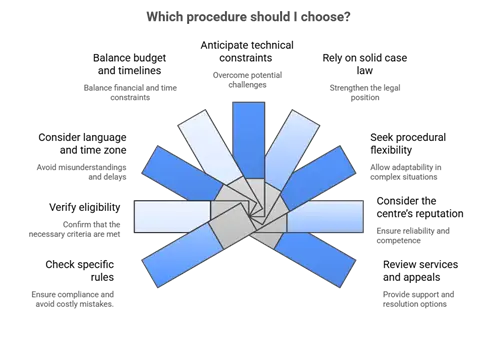Sommaire
Introduction
The UDRP (Uniform Domain Name Dispute Resolution Policy) and the URS (Uniform Rapid Suspension System) are two essential extrajudicial mechanisms for effectively combating cybersquatting and abusive domain name registrations. Administered under the auspices of ICANN, these procedures provide trademark owners with a fast and targeted means of enforcing their rights globally, without resorting to lengthy and costly court actions.
However, the success of any action largely depends on the strategic choice of the arbitration and mediation center. Each institution has its own specific features in terms of procedural rules, timelines, costs, and the quality of its decisions. Given this diversity, it is essential to adopt a methodical approach, based on objective criteria and a careful analysis of your needs.
In this article, we share 10 key tips to help you make this crucial decision and optimise the protection of your digital assets.
Legal framework of UDRP and URS proceedings
Tip 1 : Determine whether your dispute requires a UDRP or a URS
Before initiating any action, it is essential to assess the nature of the infringement. UDRP is appropriate where the objective is the transfer or permanent deletion of the domain name, for instance, in cases of clear cybersquatting. URS, which is faster and less expensive, is limited to temporary suspension and applies only to new gTLDs. A strategic review of the facts, the commercial risk, and long-term objectives will ensure that you choose the most appropriate procedure and avoid wasting time on an unsuitable path.
Tip 2 : Review the Supplemental Rules of the selected center
Each accredited center applies the baseline rules defined by ICANN but adds “Supplemental Rules” that can influence the process. These set deadlines for filing, evidence formats, accepted languages, and proof requirements. A thorough review before filing allows you to anticipate constraints and prepare a compliant case file, reducing the risk of dismissal for procedural defects.
Choosing based on the disputed domain name
Tip 3 : Check the policy applicable to the domain extension
Not all extensions fall under UDRP or URS. Certain ccTLDs voluntarily adopt UDRP (e.g., .tv, .me), while URS applies only to new gTLDs such as .shop, .app, or .paris. Before starting a procedure, confirm the applicability of the rules with the registry of the extension. This is critical to avoid initiating an inapplicable action, which could waste costs and delay enforcement.
Tip 4 : Select a center adapted to the language and time zone
The language of the proceedings directly impacts speed and cost. Choosing a center that operates in your language, or in the registration agreement’s language, avoids high translation costs and reduces the risk of errors. Time zone alignment is also important, as it facilitates communication with panelists and administrative staff particularly for urgent exchanges or submission of additional evidence under tight deadlines.
Assessing costs, timelines, and procedural rules
Tip 5 : Balance budget, urgency, and expected outcome
Costs and timelines vary significantly. URS generally costs between USD 300 and 500 and can conclude in under 20 days, but only provides suspension. UDRP, which is more expensive (often several thousand euros), takes an average of 60–75 days and results in a transfer or permanent deletion. Your choice should be guided by whether you prioritise speed or the permanence of the remedy.
Tip 6 : Anticipate technical and administrative constraints
Some centers require specific electronic formats, online filing tools, or strict file size and format rules. Others still require physical submission of signed documents. Failing to anticipate these requirements can lead to delays or even dismissal of the complaint. Preparing for these in advance ensures smooth procedural progress.
Service quality and legal expertise
Tip 7 : Choose a center with a rich and consistent body of case law
Centers such as WIPO have extensive decision databases and research tools that consolidate international case law. This consistency is invaluable for predicting the likely outcome of a case and crafting a strong argument. A center with few precedents offers less predictability in decision-making trends.
Tip 8 : Opt for a center offering flexibility and adaptability
Some disputes require procedural flexibility, such as extensions of deadlines, acceptance of late-filed evidence, or hearings in an additional language. A center capable of tailoring its process to the complexity of your case can greatly improve your chances of success, especially in multi-respondent or cross-border matters.
Other decisive factors
Tip 9 : Consider the reputation and experience of the center
A center’s reputation is often tied to the quality of its panelists and the consistency of its rulings. An experienced center inspires trust among the parties and can also facilitate enforcement of decisions by registrars and registries. This institutional credibility is a key factor in legal security.
Tip 10 : Assess additional services and avenues for appeal
Some centers provide added value through technical assistance, practical guides, or an appeal mechanism in case of an adverse decision. Such features can be decisive, particularly under URS where an appeal process exists. Evaluating these advantages ensures you select a center offering more than just case management.
Conclusion
Selecting the right arbitration and mediation center for UDRP/URS proceedings is a strategic decision that must account for the nature of the dispute, the domain extension, timelines, costs, language, and the institution’s experience and reputation. Applying these ten tips will maximise your chances of success and secure the protection of your digital assets.
Dreyfus & associés assists clients at every stage of these proceedings, backed by its recognised expertise in Internet and domain name litigation.
Nathalie Dreyfus with the support of the entire Dreyfus team.
FAQ
What is the difference between UDRP and URS ?
UDRP allows transfer or permanent deletion; URS provides only temporary suspension.
How do I know if my domain name is eligible for URS ?
URS applies only to new gTLDs approved by ICANN.
Which center should I choose to maximise my chances of success ?
Select a center with a rich case law history and recognised decision consistency, such as WIPO.
Do costs vary from one center to another ?
Yes, each center sets its own fees and terms.
Can an URS decision be appealed ?
Yes, some centers provide an internal appeal mechanism.


